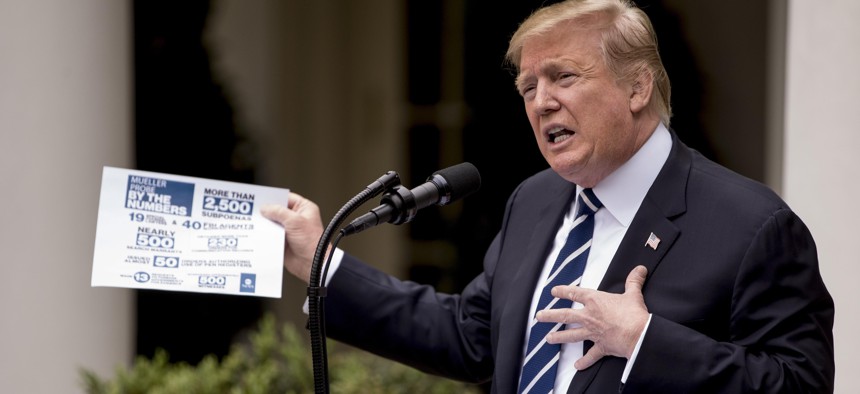Infrastructure Talks Between Trump and Democrats Crumble

President Donald Trump holds up a stat sheet having to do with the Mueller Report as he speaks in the Rose Garden at the White House in Washington, Wednesday, May 22, 2019. AP Photo/Andrew Harnik

Connecting state and local government leaders
The two sides had planned to sit down Wednesday to talk about a possible $2 trillion package.
Talks between President Trump and Democrats about the possibility of significant infrastructure legislation broke down on Wednesday.
There had been a meeting scheduled for 11:15 a.m. between Trump, House Speaker Nancy Pelosi and Senate Minority Leader Chuck Schumer and others. About three weeks ago, the two sides agreed to move ahead with discussions about a $2 trillion public works package.
But earlier in the morning, Pelosi told reporters, referring to Democrats, that "we believe that the president of the United States is engaged in a coverup."
This drew a rebuke from Trump, who appeared in the Rose Garden around the time of the scheduled infrastructure meeting.
"I don't do cover-ups," he said.
The president went on to criticize the recently completed Mueller probe into Russian interference in the 2016 election. He said he learned Tuesday night Democrats had planned a meeting where they would discuss "the I-word," an apparent reference to impeachment.
"Can you imagine? I don't speak to Russians about campaigns," he said.
"I've said from the beginning," Trump added, "you probably can't go down two tracks. You can go down the investigation track, and you can go down the investment track or the track of 'let’s get things done for the American people.'"
He described how the ill-fated meeting unfolded.
"I walked into the room and I told Senator Schumer, Speaker Pelosi, I want to do infrastructure," he said. "But you know what, you can't do it under these circumstances."
Schumer, back at the Capitol, suggested that the president's actions were pre-planned. "It's clear that this was not a spontaneous move."
He said that Democrats went to the meeting prepared to have a serious conversation about infrastructure, and held up what he said was a 35-page plan that outlined ideas for a package.

"Despite signals in the previous few weeks that he might not be serious, we went forward," he said.
"We were interested, we are interested in doing infrastructure, it's clear the president isn't," Schumer added. "Now that he was forced to actually say how he'd pay for it, he had to run away."
Trump has identified infrastructure as a priority since his early days in office. His administration put forward a highly anticipated public works plan last year. But it failed to go anywhere on Capitol Hill.
How to pay for new federal spending on road, airports, waterworks and the like has been a major stumbling block.
After a meeting with Trump in late April about infrastructure, Democrats said they would convene again with the president and his team around this time to hear more about his ideas for funding.
On Tuesday, Trump sent Pelosi and Schumer a letter saying it was his "strong view" that Congress should approve a new trade deal between the U.S., Canada and Mexico before focusing on infrastructure.
"That was not a good sign," U.S. Rep. Peter DeFazio, an Oregon Democrat, who chairs the House Committee on Transportation and Infrastructure, said Wednesday.
The letter also said the Highway Trust Fund—a main federal account for highway and mass transit spending—is "essentially bankrupt" and noted that it needs to be reauthorized by September 2020.
"We believe that reauthorization is the best vehicle to achieve our goals," the letter added.
Taxes on gasoline and diesel fuel provide a big share of revenue for the trust fund. The federal gas tax was last raised about 25 years ago.
Mixed messages have emerged from the White House throughout Trump's term about whether he would back a gas tax hike.
Kellyanne Conway, a counselor to the president, around the time of last month's infrastructure meeting, played down Trump's enthusiasm for raising the tax, referring to him as "the guy who lowers taxes."
Some business groups, like the U.S. Chamber of Commerce, have voiced support for the increase. But key Republicans in Congress have shown little appetite for it. And the politics of enacting a gas tax hike promise to become more fraught heading toward the 2020 elections.
Another hurdle for the type of infrastructure package described by Trump and Democrats is that it would not only cover roads and transit, but also areas the gas tax is unlikely to fund, like water and sewer systems, as well as rural broadband networks.
For now, it appears discussions between the White House and Democrats about whether and how to significantly boost spending on these and other public works will be left to another day.
"I'm still hopeful that he will, you know, in a more calm moment, invite us back and provide leadership," DeFazio said. "We can come to agreement here in Washington, this is not a partisan issue."
This story has been updated.
Bill Lucia is a Senior Reporter for Route Fifty and is based in Olympia, Washington.

NEXT STORY: Next-generation data centers





